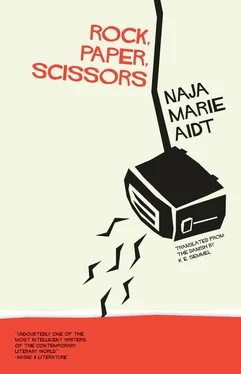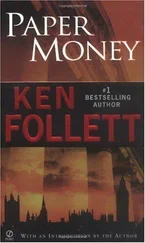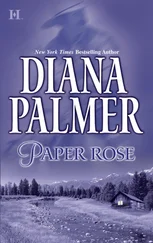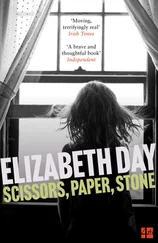Wind rips at the enormous white tarpaulins covering the façade of the adjacent building. He still has no desire to return to Patricia, but he can’t stay out here. A woman opens a window on the second floor. He meets her glance for a moment, then her face disappears behind a checkered cloth that she shakes out vigorously. Crumbs and fluff billow in the air like snow. He takes the elevator up and carries the grocery bags into the apartment. The bathroom door opens, and Patricia exits with a towel around her head. “I’m sorry,” he says.
“Every time you walk through that door you say ‘I’m sorry’.”
“I know,” he says.
“Did you go to the store?”
“Just picked up a few things.” He turns and grabs the bags and walks down the hall. He gives her a quick peck on the cheek as he passes by; she smells like fresh laundry, but there’s also this hint of earthiness, of wet soil, which he always finds off-putting. He sets the bags on the kitchen table and checks his cellphone. Jenny has called several times. She’s sent three text messages: “please can’t you help me?” and “I’ll take it to the shop then” and a half-hour ago: “aunt k called.” He hears Patricia setting up the ironing board in the living room. With the phone in his hand he opens the bedroom door. It’s cool and dark in here. He sits on the bed. His clock ticks faintly. He doesn’t want to call. After a short time, Jenny answers, out of breath: “What do you want?”
“What’s up with the toaster?”
“It doesn’t work.”
“Why are you obsessed with it? Why do you want that old piece of shit? Why are you harassing me?”
“Am I harassing YOU? I think you’re harassing me. Why won’t you help me?”
“Don’t waste your money taking it to the shop, that’s crazy. Don’t waste your money on him.”
“He’s dead. It’s my toaster now.”
“Don’t you hear how ridiculous that sounds, Jenny?”
“Should I hang up now? Stop it, Alice, I’m on the phone!”
“What’s she doing?”
“Badgering me for money. Won’t you just look at it?”
“Only if you tell me why you’re so obsessed with it. Why didn’t you take a painting instead? Or Grandma’s dishes?”
Patricia stands in the doorway, a stack of creased shirts over her arm, and looks at him sharply. Then she leaves.
“Because,” Jenny sighs, her voice softening. “That is, because, you know, it meant a lot to me when I was a child. When we made toast. We lived on bread, Thomas. It was magical to me, it could make plain things interesting. Toasted bread was fragrant and tasty, especially if we had butter or jam. I know it’s nostalgic. But it’s a good memory. For me, at least.”
Now it’s Thomas who sighs. “A good memory. Do you really mean that?”
“Yes.” Long silence. “I’d like to hold onto that good memory.”
“It sounds like you’ve taken a course on positive thinking.”
“I haven’t. I’m just thinking that I might as well make the best out of it.”
“Out of what?”
“Well — I don’t know. Everything.” They fall silent. He hears Alice clattering in the background, and a television. Jenny clears her throat.
“Okay,” he says. “I’ll look at it. Will you be home in an hour and a half?”
“I’m always home, Thomas.”
They hang up, and he sits staring at his shoes. Then he stands and walks back to the kitchen. While he puts his groceries in the fridge, Patricia comes in. She says, “You seem very strange.”
“What makes you say that?”
“Because that’s what I think.”
“Are you trying to start a fight?”
“No.”
“Have I done something wrong?”
“No. But you seem strange.”
“Oh, Patricia. Stop. I’m just not quite myself.”
“How so?”
“Restless. Odd.”
“What do you mean ‘odd’?”
“Claustrophobic.”
“Claustrophobic? Do you want to talk about it?”
He looks out the window. “I’m going over to Jenny’s soon. I promised I’d help her with something.”
“I’m going with you.”
“You don’t have to do that. I won’t be long. We can see a film later.”
“Don’t you want me to come with you?”
“That’s not what I meant.”
“Well, then I’m coming with you.” Patricia gives him a look, challenging him to tell her she can’t come. Her eyes bore into his. “It’s been a long time since I saw Jenny and Alice.” Thomas glances at the floor. And so Patricia gives up her ironing and goes with him. The sky’s blue, and the green river water reflects the treetops and the silhouettes of houses. The train screeches slowly southward, out toward the suburbs that form a broad and frayed ring around the city: public housing high-rises and wide swaths of rundown row houses, body shops, storage sheds. Huge factories surrounded by barbed-wire fence, smaller industrial plants. A junkyard here, a warehouse with a big wind-swept parking lot there, a lumberyard, then more of the tall cement towers where people are crammed together beneath ceilings thick with asbestos, the best of which have access to a boxlike balcony. Though she’s now on a sugar-free diet, Patricia has bought an apple pie. She squeezes his hand. They walk through the streets where young men hang out in front of delis and fast food joints. A whiff of beer and smoke wafts from the bars; they pass the shopping plaza with the movie theater, where people stand in line at the ticket window. A gaggle of women scowl at Patricia when she stops to pick up her silk scarf. The elevator rocks threateningly. It snails its way up to the eighth floor. It smells of piss here. They look at each other the entire way up, but say nothing. Alice opens the door. She seems surprised. “Look who’s here!” But she gives Patricia a hug and lets them enter. For a moment Thomas thinks: She looks like Mom. But that’s probably just his imagination. Alice is small and slender and has a prominent nose and a pretty, curvy Cupid’s bow like her father. Her golden-brown skin is smooth and fine, her dark eyes almond-shaped and a little crooked. She’s shaved her head. A snake tattoo threads its way up over her neck to the back of her head. She’s only just turned eighteen. Dropped out of school, unemployed. For a moment, Thomas recalls her sitting on his lap when she was little. The way she’d held onto his neck when he carried her. Now she steps to the side so he can enter the apartment. And here comes Jenny, smiling, from the kitchen; she looks hot and sweaty, her lipstick seeping into the small wrinkles near her mouth. She sees Patricia and says: “ You’re here?” Patricia smiles and hands her the pie. The kitchen is a mess, and a large pot simmers on the stove. “How nice. I was just making some soup.” Jenny washes her hands. “I thought Thomas might want some lunch, but maybe you’ve already eaten?” Thomas leans against the fridge. One can see a long way from the kitchen window: the forest in the distance, high-rises, other parts of the city. When he leans forward and glances down at the area between the buildings, his stomach lurches: networks of trails, a playground, parked cars. A few children run across one of the fields wielding a kite on a string. It swirls in the air and flutters back and forth in the wind, and it looks as though they can barely hold onto it. He turns. The soup is sludgy and gray, and smells nauseatingly of cabbage and pork fat. Patricia converses politely, Thomas watches a flock of geese. Or are they ducks? He goes to the living room, where the curtains are drawn. Darkness, low furniture, a whole lot of embroidered pillows on the sofa. On the wall a number of faded drawings from when Alice was a kid, signed with large, clumsy letters. For the world’s best mom. Congratulations Mom. A reproduction of a picture of a deer standing beside a lake. A framed photograph of himself and Jenny. In it, they are young and standing under a tall tree. Jenny’s skinny. She’s wearing a white dress and her thick reddish-blonde hair spills to her waist. He just looks like an overgrown boy. They hug each other, smiling. Their feet are bare. Maloney was the one who’d taken the photograph. Light flickers between the green leaves. A walk in the woods. A very long time ago. It smells stuffy in the apartment, and he wants to open a window, but marches down the hallway toward the bedrooms instead. The shelving units have seen better days. A bunch of bric-a-brac, some books, washed-out bed linens and towels in untidy stacks. A door is ajar. Alice is lying on her bed with a man. Thomas hurries back to the kitchen. Jenny has ladled up the soup, there’s no way out of it now. “Alice and Ernesto! Lunch!” Jenny shouts. “Is that her boyfriend?” Patricia whispers. Jenny nods, and rolls her eyes and shakes her head resignedly. They sit around the little camping table. Jenny passes out pink napkins adorned with teddy bears. Thomas grinds peppercorns over his bowl. Unidentifiable chunks of fatty gray meat bob around in the murky liquid. He lifts a piece of overcooked cabbage with his spoon and lets it fall back into the soup. What is she thinking, serving such dog food. She knows that he — that he can’t. That he has better taste than this. That this is. . The kids drift in. This Ernesto is only a head taller than Alice, but he’s broad and muscular. His hair is short, black, and shiny. He greets them politely, introduces himself. He must be older than Alice, Thomas thinks, feeling discomfort, both at the soup — which actually tastes like food served at an institution — and Ernesto’s hairy hands, one firmly planted on Alice’s thigh as he shovels soup into his mouth with the other. Alice stirs her spoon around her bowl and picks at a piece of bread. “How are you doing?” Patricia tries. “It’s been so long since I’ve seen you.” “Really good,” Alice says. “Are you still looking for work?” Alice nods disinterestedly. “No, you’re not,” Jenny says. Ernesto glances up. Alert. Solid jawline. “And how about you?” Patricia regards him with interest. “Are you a student? Are you in college?” All of a sudden she sounds rather strident. He smiles curtly. “Hardly,” he says in a calm, friendly voice. “I’m a musician.” “Really, how exciting — are you a singer?” He shakes his head. “Drummer.” So that’s why he’s so muscular, Thomas thinks, clearing his throat. “Ernesto plays in a really cool band,” Alice explains, pushing her bowl aside. “They’re super awesome. You can listen to them online, if you want. They’re called El Pozo.” She stands. “They just sit around, doing nothing at all,” grumbles Jenny. “You don’t do a thing. I don’t know how you can stand it.”
Читать дальше












